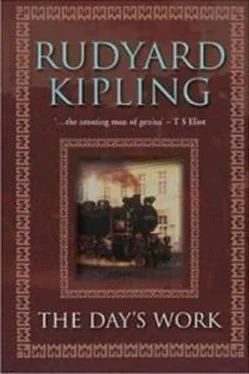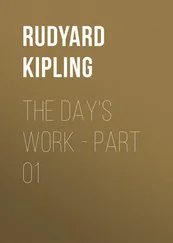Джозеф Киплинг - The Day's Work - Volume 1
Здесь есть возможность читать онлайн «Джозеф Киплинг - The Day's Work - Volume 1» весь текст электронной книги совершенно бесплатно (целиком полную версию без сокращений). В некоторых случаях можно слушать аудио, скачать через торрент в формате fb2 и присутствует краткое содержание. Год выпуска: 2014, Издательство: epubBooks Classics, Жанр: Прочие приключения, на английском языке. Описание произведения, (предисловие) а так же отзывы посетителей доступны на портале библиотеки ЛибКат.
- Название:The Day's Work - Volume 1
- Автор:
- Издательство:epubBooks Classics
- Жанр:
- Год:2014
- ISBN:нет данных
- Рейтинг книги:3 / 5. Голосов: 1
-
Избранное:Добавить в избранное
- Отзывы:
-
Ваша оценка:
- 60
- 1
- 2
- 3
- 4
- 5
The Day's Work - Volume 1: краткое содержание, описание и аннотация
Предлагаем к чтению аннотацию, описание, краткое содержание или предисловие (зависит от того, что написал сам автор книги «The Day's Work - Volume 1»). Если вы не нашли необходимую информацию о книге — напишите в комментариях, мы постараемся отыскать её.
The Day's Work - Volume 1 — читать онлайн бесплатно полную книгу (весь текст) целиком
Ниже представлен текст книги, разбитый по страницам. Система сохранения места последней прочитанной страницы, позволяет с удобством читать онлайн бесплатно книгу «The Day's Work - Volume 1», без необходимости каждый раз заново искать на чём Вы остановились. Поставьте закладку, и сможете в любой момент перейти на страницу, на которой закончили чтение.
Интервал:
Закладка:
Young John Chinn was decanted at the verandah of the Wuddars' lonely mess–house from the back seat of a two–wheeled cart, his gun–cases cascading all round him. The slender little, hookey–nosed boy looked forlorn as a strayed goat when he slapped the white dust off his knees, and the cart jolted down the glaring road. But in his heart he was contented. After all, this was the place where he had been born, and things were not much changed since he had been sent to England, a child, fifteen years ago.
There were a few new buildings, but the air and the smell and the sunshine were the same; and the little green men who crossed the parade–ground looked very familiar. Three weeks ago John Chinn would have said he did not remember a word of the Bhil tongue, but at the mess door he found his lips moving in sentences that he did not understand—bits of old nursery rhymes, and tail–ends of such orders as his father used to give the men.
The Colonel watched him come up the steps, and laughed.
"Look!" he said to the Major. "No need to ask the young un's breed. He's a pukka Chinn. 'Might be his father in the Fifties over again."
"'Hope he'll shoot as straight," said the Major. "He's brought enough ironmongery with him."
"'Wouldn't be a Chinn if he didn't. Watch him blowin' his nose. 'Regular Chinn beak. 'Flourishes his handkerchief like his father. It's the second edition—line for line."
"'Fairy tale, by Jove!" said the Major, peering through the slats of the jalousies. "If he's the lawful heir, he'll…. Now old Chinn could no more pass that chick without fiddling with it than…."
"His son!" said the Colonel, jumping up.
"Well, I be blowed!" said the Major. The boy's eye had been caught by a split–reed screen that hung on a slew between the veranda pillars, and, mechanically, he had tweaked the edge to set it level. Old Chinn had sworn three times a day at that screen for many years; he could never get it to his satisfaction.
His son entered the anteroom in the middle of a fivefold silence. They made him welcome for his father's sake and, as they took stock of him, for his own. He was ridiculously like the portrait of the Colonel on the wall, and when he had washed a little of the dust from his throat he went to his quarters with the old man's short, noiseless jungle–step.
"So much for heredity," said the Major. "That comes of four generations among the Bhils."
"And the men know it," said a Wing officer. "They've been waiting for this youth with their tongues hanging out. I am persuaded that, unless he absolutely beats 'em over the head, they'll lie down by companies and worship him."
"Nothin' like havin' a father before you," said the Major. "I'm a parvenu with my chaps. I've only been twenty years in the regiment, and my revered parent he was a simple squire. There's no getting at the bottom of a Bhil's mind. Now, why is the superior bearer that young Chinn brought with him fleeing across country with his bundle?" He stepped into the verandah, and shouted after the man—a typical new–joined subaltern's servant who speaks English and cheats in proportion.
"What is it?" he called.
"Plenty bad man here. I going, sar," was the reply. "Have taken Sahib's keys, and say will shoot."
"Doocid lucid—doocid convincin'. How those up–country thieves can leg it! He has been badly frightened by some one." The Major strolled to his quarters to dress for mess.
Young Chinn, walking like a man in a dream, had fetched a compass round the entire cantonment before going to his own tiny cottage. The captain's quarters, in which he had been born, delayed him for a little; then he looked at the well on the parade–ground, where he had sat of evenings with his nurse, and at the ten–by–fourteen church, where the officers went to service if a chaplain of any official creed happened to come along. It seemed very small as compared with the gigantic buildings he used to stare up at, but it was the same place.
From time to time he passed a knot of silent soldiers, who saluted. They might have been the very men who had carried him on their backs when he was in his first knickerbockers. A faint light burned in his room, and, as he entered, hands clasped his feet, and a voice murmured from the floor.
"Who is it?" said young Chinn, not knowing he spoke in the Bhil tongue.
"I bore you in my arms, Sahib, when I was a strong man and you were a small one—crying, crying, crying! I am your servant, as I was your father's before you. We are all your servants."
Young Chinn could not trust himself to reply, and the voice went on:
"I have taken your keys from that fat foreigner, and sent him away; and the studs are in the shirt for mess. Who should know, if I do not know? And so the baby has become a man, and forgets his nurse; but my nephew shall make a good servant, or I will beat him twice a day."
Then there rose up, with a rattle, as straight as a Bhil arrow, a little white–haired wizened ape of a man, with medals and orders on his tunic, stammering, saluting, and trembling. Behind him a young and wiry Bhil, in uniform, was taking the trees out of Chinn's mess–boots.
Chinn's eyes were full of tears. The old man held out his keys.
"Foreigners are bad people. He will never come back again. We are all servants of your father's son. Has the Sahib forgotten who took him to see the trapped tiger in the village across the river, when his mother was so frightened and he was so brave?"
The scene came back to Chinn in great magic–lantern flashes. "Bukta!" he cried; and all in a breath: "You promised nothing should hurt me. Is it Bukta?"
The man was at his feet a second time. "He has not forgotten. He remembers his own people as his father remembered. Now can I die. But first I will live and show the Sahib how to kill tigers. That that yonder is my nephew. If he is not a good servant, beat him and send him to me, and I will surely kill him, for now the Sahib is with his own people. Ai, Jan haba—Jan haba! My Jan haba! I will stay here and see that this does his work well. Take off his boots, fool. Sit down upon the bed, Sahib, and let me look. It is Jan haba."
He pushed forward the hilt of his sword as a sign of service, which is an honour paid only to viceroys, governors, generals, or to little children whom one loves dearly. Chinn touched the hilt mechanically with three fingers, muttering he knew not what. It happened to be the old answer of his childhood, when Bukta in jest called him the little General Sahib.
The Major's quarters were opposite Chinn's, and when he heard his servant gasp with surprise he looked across the room. Then the Major sat on the bed and whistled; for the spectacle of the senior native commissioned officer of the regiment, an "unmixed" Bhil, a Companion of the Order of British India, with thirty–five years' spotless service in the army, and a rank among his own people superior to that of many Bengal princelings, valeting the last–joined subaltern, was a little too much for his nerves.
The throaty bugles blew the Mess–call that has a long legend behind it. First a few piercing notes like the shrieks of beaters in a far–away cover, and next, large, full, and smooth, the refrain of the wild song: "And oh, and oh, the green pulse of Mundore—Mundore!"
"All little children were in bed when the Sahib heard that call last," said Bukta, passing Chinn a clean handkerchief. The call brought back memories of his cot under the mosquito–netting, his mother's kiss, and the sound of footsteps growing fainter as he dropped asleep among his men. So he hooked the dark collar of his new mess–jacket, and went to dinner like a prince who has newly inherited his father's crown.
Old Bukta swaggered forth curling his whiskers. He knew his own value, and no money and no rank within the gift of the Government would have induced him to put studs in young officers' shirts, or to hand them clean ties. Yet, when he took off his uniform that night, and squatted among his fellows for a quiet smoke, he told them what he had done, and they said that he was entirely right. Thereat Bukta propounded a theory which to a white mind would have seemed raving insanity; but the whispering, level–headed little men of war considered it from every point of view, and thought that there might be a great deal in it.
Читать дальшеИнтервал:
Закладка:
Похожие книги на «The Day's Work - Volume 1»
Представляем Вашему вниманию похожие книги на «The Day's Work - Volume 1» списком для выбора. Мы отобрали схожую по названию и смыслу литературу в надежде предоставить читателям больше вариантов отыскать новые, интересные, ещё непрочитанные произведения.
Обсуждение, отзывы о книге «The Day's Work - Volume 1» и просто собственные мнения читателей. Оставьте ваши комментарии, напишите, что Вы думаете о произведении, его смысле или главных героях. Укажите что конкретно понравилось, а что нет, и почему Вы так считаете.












